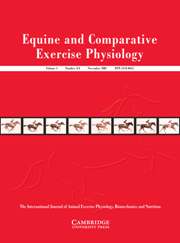Article contents
Vitamin E intake and systemic antioxidant status in competitive endurance horses
Published online by Cambridge University Press: 09 March 2007
Abstract
The objective was to compare vitamin E content in the total diet of Arabian horses competing in the 80 km Research Ride 2002 to the oxidative stress and antioxidant measures throughout the race. Prior to the race, riders completed a detailed nutritional survey, which was used to calculate vitamin E intake. Blood samples, temperature and heart rate were taken the day before the race, at 27 and 48 km during the race, at race completion or elimination and 3 h after race completion. Plasma lipid hydroperoxides, α-tocopherol (TOC), creatine kinase (CK), aspartate aminotransferase (AST), albumin, red and white blood cell total glutathione and glutathione peroxidase were measured. Data were analyzed by Pearson's correlation in SAS. From the survey, it was estimated that horses consumed 2265±114 IU day−1 of vitamin E. A negative correlation was found between the vitamin E intake and CK (r = −0.23; P = 0.002), and AST (r = −0.22; P = 0.003). A positive correlation was found between the vitamin E intake and plasma TOC (r = 0.15; P = 0.005) at all sample times. This suggests that intensely exercising horses supplemented with vitamin E may not have an improved welfare and performance if they are supplemented vitamin E versus what is naturally found in forages and commercial feeds.
- Type
- Research Article
- Information
- Copyright
- Copyright © Cambridge University Press 2005
References
- 10
- Cited by


